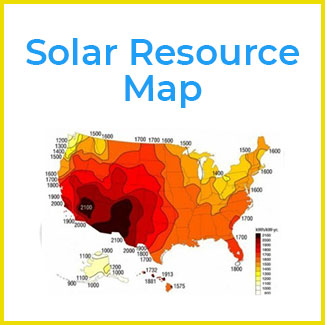Many people think how much sun they get is the main driver for going solar. It is not.
Of course having a roof that is clearly exposed to the sun is important. Having shading from trees, chimneys or other structures will affect your ability to put solar and make a decent return on your investment.
Having said that, provided that you have the appropriate space for your solar system, the amount of sun you get is relatively much less important than the price you pay for your electricity.
The solar energy production of a solar system in the US ranges only about plus or minus 20% from the national average based on your location.
The average kWh per kW production of a solar system is about 1500 kWh per kW in the US. In the below map, you will notice that in a not-so-sunny location like Seattle, production of solar system goes down to about 1200 kWh per kW, and in a sunny location like San Diego, it goes up to about 1700 kWh per kW.
On the other hand, the value of electricity generated (i.e. the value of a kWh) ranges so widely. The electricity price of a kWh can be as low as 8 cents in Georgia where as it can be as high as 50 cents in Hawaii.
This means a solar system owner would realize almost 7 times more value from solar generated electricity in Hawaii versus Georgia.
Therefore, understanding what you pay for per kWh is key in understanding whether solar makes sense for you. One other key aspect in doing this analysis might be understanding the rate schedule of your utility company. Many utility companies offer varying rate schedules based on tiered pricing or based on your time-of-use. Net metering rules allow you to earn credit for your solar production at your retail rate.
A good rule of thumb: if you are paying more than 13 cents per kWh than solar will most likely make sense for you.
Understanding exactly how your rate schedule works is key to make the decision to go solar. These days, most of the utility companies have customer service departments that help you decide the most appropriate rate schedule with or without a solar system. So if you have questions about going solar, you should contact your local utility company.

